|
18 High Street
Old Brompton
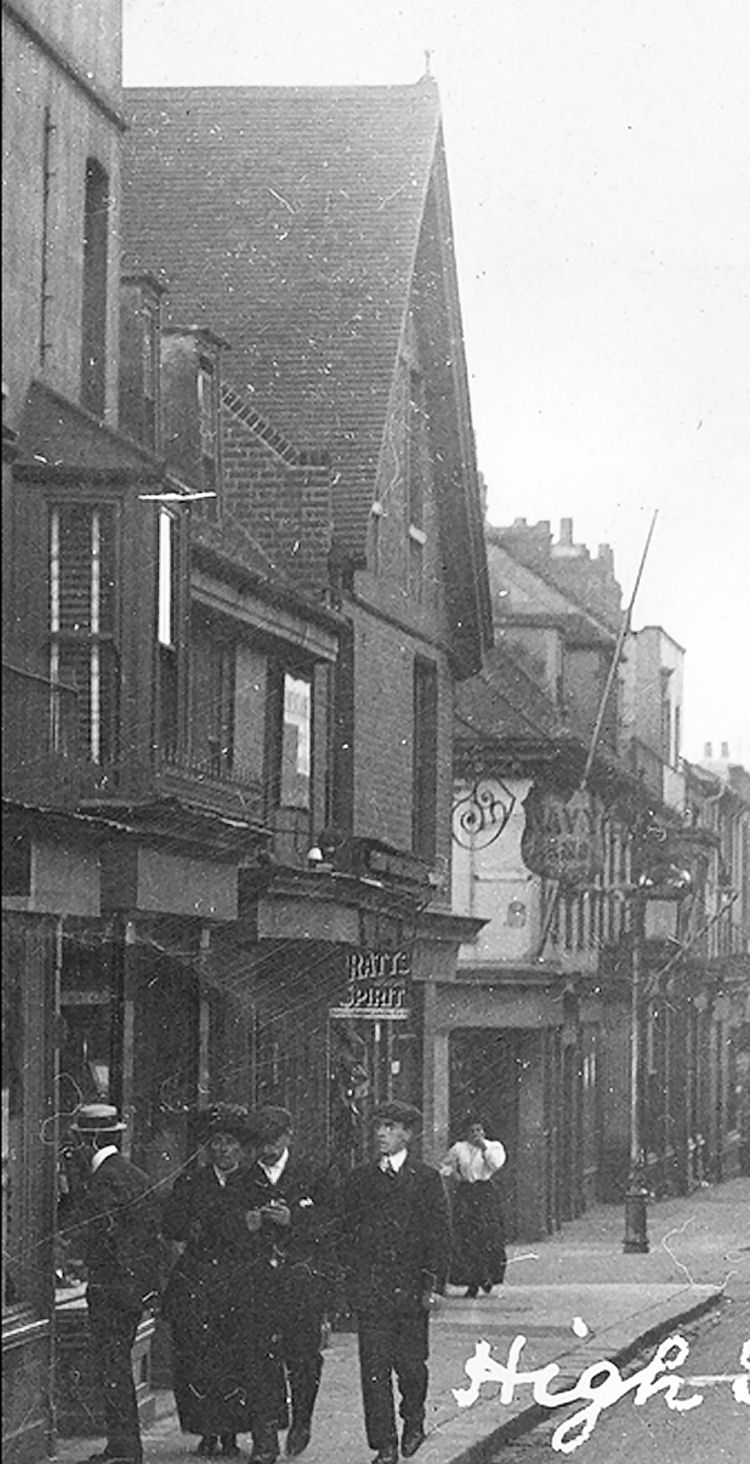
Above photo, date 1916, from www.Flickr.com
by Ben Levick. |
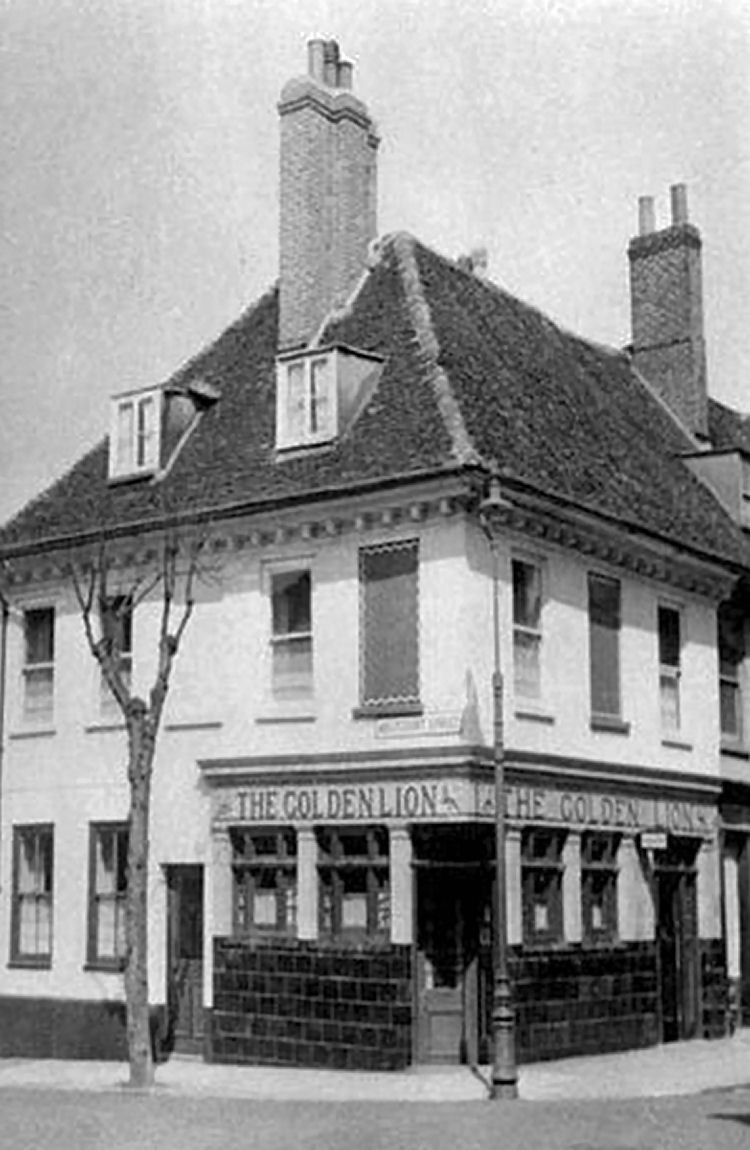
Above photo 1954, from www.Flickr.com
by Ben Levick. |
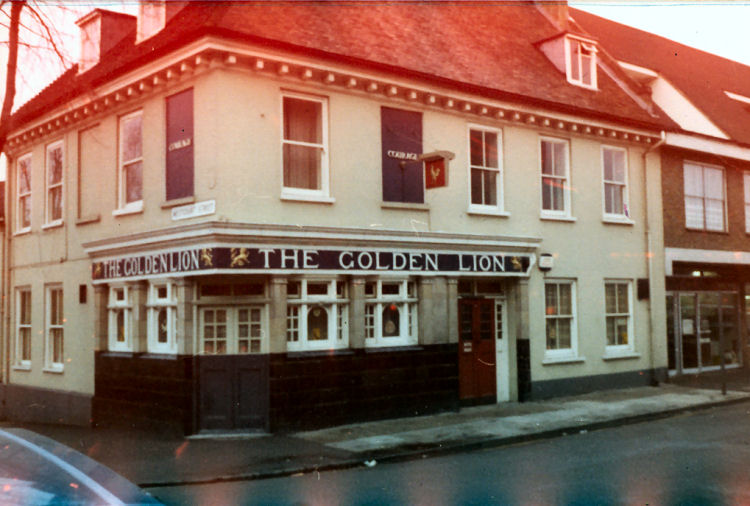
Photos taken circa 1978-79 from
http://www.flickr.com
by Ben Levick. |
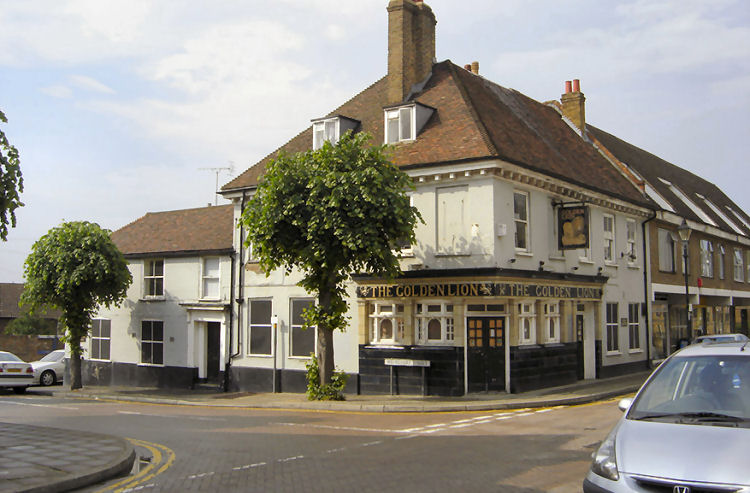
Photos 6 June 2010 from
http://www.flickr.com
by Ben Levick. |

Above photo December 2010, from www.Flickr.com
by Ben Levick. |
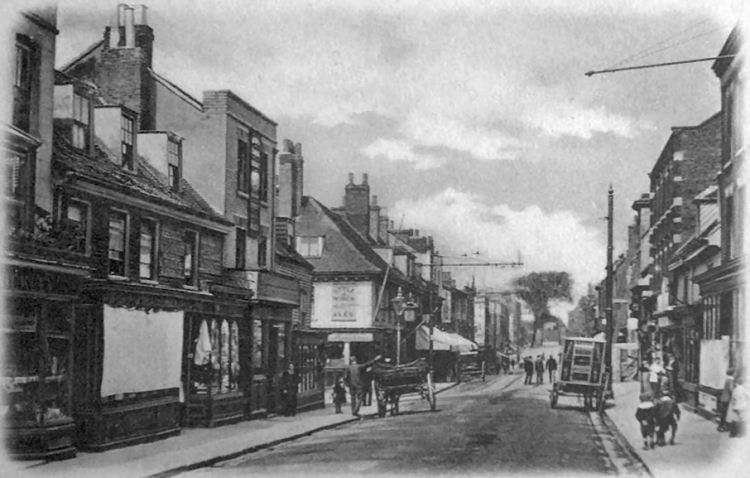 Above photo 2011, from www.Flickr.com
by Ben Levick. Who says:- "View looking north along Brompton High
Street, towards the Royal Engineers' Barracks (the old gate can just be
seen in the distance). This view clearly shows the "Navy
Arms" (now long gone) and the "Golden Lion" (gone as a pub, but
still there as a building). The tram tracks can be seen running along
the High Street and down Westcourt Street.
Shops on west (left) side, left to right, George Buckley, bootmaker's
shop (no.8), James Weatherley, oil and colour man's shop (no.10), "Navy
Arms" public house (no.14), junction with Westcourt Street, "Golden
Lion" public house and range of buildings to north and range of shops on
east side. Street scene shows parked horse-drawn vehicles, pedestrians,
carriageway, tram lines and shop awnings.
The picture can be dated to 1902 from the tram lines running down
Westcourt Street. The tram service through Brompton only ran down
Westcourt Street from June to about November 1902, the tram line being
moved to Middle Street after a fatal accident at the bottom of Westcourt
Street in October of that year. |
 Above photo 2011, from www.Flickr.com
by Ben Levick. Who says:- "The "Navy
Arms" and the building beyond it (Nos 14 & 16) are replaced by a
more modern building, and the old buildings beyond the "Golden Lion" are
all gone. There are no longer tram tracks and the gate into the barracks
is gone." |
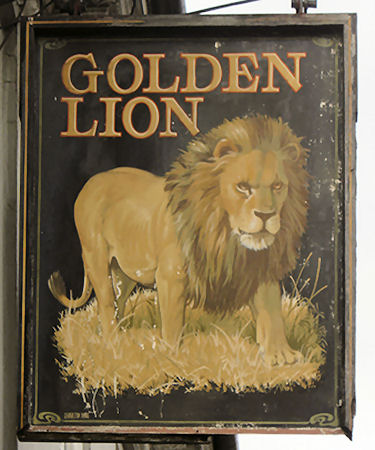
Above sign 2011. |
This is said to be one of Brompton's oldest pubs, it appears to have been
founded in the about 1705.
William Palmer was the licensee in 1766-9. and after his death his widow
took over. It was a commercial inn from which Palmer ran a transport
service.
Until the growth of New Brompton in the mid-19th century the "Golden
Lion" was very important to the festivities of Hogh Constable's Day, the day
traditionally starting there with breakfast, and ending there with a Public
Dinner.
Used by the Conservative Working Men's Club until they opened their own
club opposite in 1925, and by the Ancient Order of Foresters' Robin Hood
Court.
In the late 20th century many locals referred to it as "The Beast," it
closed down c.2003
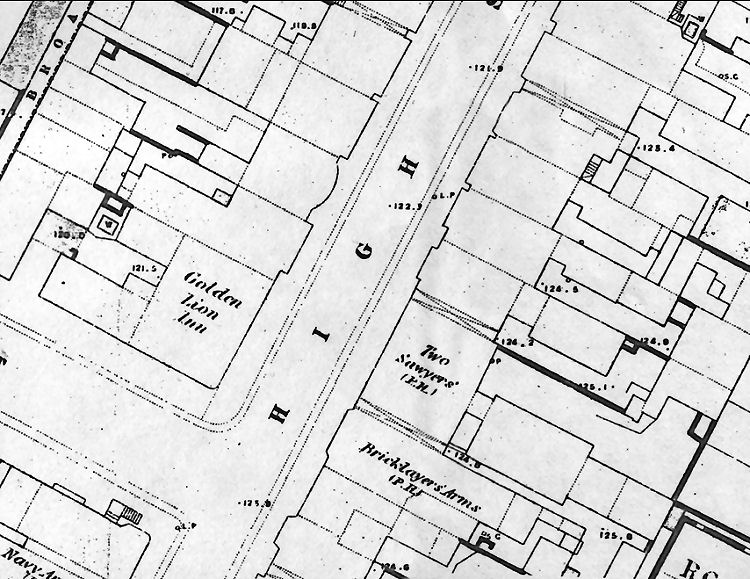
Above map of 1866 showing the "Golden Lion," "Two Sawyers" and
"Bricklayer's Arms."
|
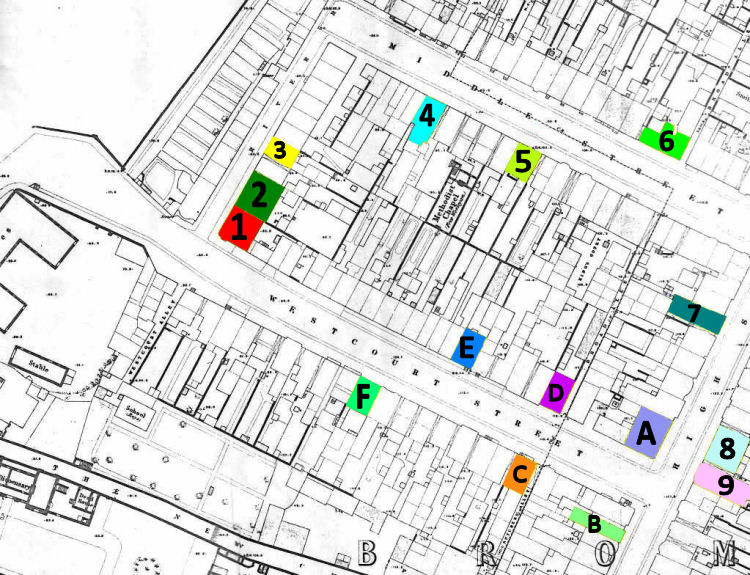
Above map, date unknown, showing the following pub locations:-
1:- "King’s Arms"
2:- "Army and Navy"
3:- "Royal Marine"
4:- "King’s Head"
5:- "Grasshopper"
6:- "Dockyard Arms"
7:- "Dolphin"
8:- "Two Sawyers"
9:- "Bricklayer's Arms"
A:- "Golden Lion"
B:- "Navy Arms"
C:- "Prince
of Wales"
D:- "Good Intent"
E:- "Duke of York"
F:- "Shipwright's Arms" |
|
Kentish Gazette - Saturday 29 June 1776.
To BE SOLD BY AUCTION.
On THURSDAY, the 4th Day of July, 1776, at the "Golden Lion," in Brompton,
near Chatham, between the Hours of Four and Five o'Clock in the
Afternoon precisely.
ALL those four Freehold Messuages or Tenements, with the several Yards
and Gardens thereto belonging, with their Appurtenances, the one of them
the "Green Dragon," and the others close adjoining; situate in Gillingham
in the County of Kent; and now in the several Occupations William Newnham, John Simson, James Basset, and Bennet Davis, under several
reserved Rents, amounting to 16l. 5s. a Year.
For further Particulars enquire of Mr. DIXON, or Mr. HICK, in Rochester.
|
|
Kentish Gazette, 30 May, 1806.
DIED.
At Brompton, on Friday last, Mr. Palmer, landlord of the "Golden
Lion" public-house.
He was about five feet ten inches high, and in circumference,
supposed the largest, and most corpulent man in this county.
|
|
From the Kentish Gazette, 3 October 1843.
PROVINCIAL INTELLEGENCE. A SOLDIER SHOT BY A COMRADE.
CHATHAM. Sept. 26.
An inquest was held this morning at the "Golden Lion Inn," Brompton,
before Mr. J. Hinde, coroner, on the body of Corporal Henry Donelly, of
the 58th Regiment, who was shot dead by a soldier of the same corps, on
Saturday afternoon, the 23rd inst. The inquest room was crowded with
civilians and military. The jury having been sworn, repaired to K house,
5 room, in the Artillery barracks, and took a view of the body; it was
lying on a bed, and presented a most awful spectacle, being covered with
gore; the right eye being forced out of the socket by the force of the
ball, which appeared to have entered under the left ear. The body was
dressed in regimentals. On the return of the jury to the jury-room, the
colonel of the regiment, Lieut. Colonel Wynyard, with Major Bridge,
Captain Nugent, and Lieutenant and Adjutant M'Lorie, were present to
watch the proceedings, also Dr. Chisholm R.E. The prisoner was brought
into the inquest-room by an escort under the charge of the Serjeant
Major, and placed before the Court.
The first witness examined was Thomas M’Connell; he said:— "I am a
private in the 58th Regiment of Foot, stationed at Brompton Barracks. I
was in the barrack-room No. 5, on Saturday afternoon, the 23rd instant,
when about 20 minutes past 3 o'clock. Corporal Donelly came in and sat
down at the table and began to eat his dinner; Corporal Henry Lowrie
came into the room at the time and said, "Donelly, well you are
returned." The deceased replied, "I am my boy, and I am for Dublin
tomorrow morning." Corporal Lowrie made some reply which I did not hear.
Corporal Lowrie walked up betwixt the bed of the deceased and Private
David Burridge’s bed, and took hold of a firelock which was resting
against the wall of the room; the fire-lock belonged to a recruit.
Lowrie cocked the piece and put it up to his shoulder and fired it; the
gun he pointed towards the deceased, who fell with his head on the plate
that he was eating from; the bullet entered the head and came out at one
of the eyes and was lying on the cloth of the table after he discharge
of the musket, which had a percussion-lock. There were several other
firelocks in the room. It is a common practice with the men, when
non-commissioned officers are absent, to snap caps off, although there
is a positive order against it. The deceased and Lowrie were generally
on good terms together, and I never heard of their having at any time
had a quarrel. Corporal Lowrie was not quartered in the same room with
the deceased. As soon as the corporal was shot, I ran out of the room
frightened, and culled out "Murder" and, seeing Major Bridge, I told him
what had occurred. In about 10 minutes I returned to my room. The
deceased placed his musket in the place that Lowrie took it from. It is
not usual for firelocks to be brought into the mess-room loaded; it is
contrary to general orders. The deceased knew his gun was loaded, as he
had just come off duty from an escort, entering the back way instead of
the front, as he ought to have done, and reported himself to his
superior officer, or to the officer on guard; if the deceased had done
so, the charge of the piece would have been drawn."
Francis Gallagar, private of the 38th Regiment, sworn:— The deceased
(Corporal Donelly) went with me in the morning of Saturday last as an
escort to Maidstone Gaol, for the purpose of bringing a prisoner to the
barracks. The deceased with myself arrived at head quartets at a quarter
past three o'clock, having first delivered the prisoner over to the main
guard at Chatham barracks. The deceased and myself belong to the 5th
room. We both entered by the back way, being the nearest. The deceased
and myself were both sober. The charge of my gun was not drawn, as the
deceased would not give me time to do it, and I took it into my room
with me, which was contrary to general orders. The first thing we did on
entering our room was to take off our accoutrements. The deceased put
his firelock down by the side of the door-post, on the right hand side,
and I put my fire-lock down against the window; there were several other
firelocks in the room at the time out of the arm rack. The prisoner came
into the room, and spoke to me for throwing about my bed on the floor.
The prisoner afterwards went towards the door, and said to the deceased,
"Where have you been?" The deceased answered him by saying, to
"Maidstone, for a prisoner from gaol, and I'm off for Dublin to-morrow
morning." The prisoner said. "Ah, it is you that has the luck, and not
me.'' The prisoner then took up the firelock that stood behind the
door, saying, "I have a great mind to shoot you, Donelly;" and putting
the musket up to his right shoulder in the usual way, and pointed it
towards the deceased, who was sitting at his dinner, instantly
discharged it. The head of the deceased immediately fell on the plate. I
directly went to the deceased, who, on lifting up his head, in a faint
voice said, "I am dead;" and died instantly. The prisoner Lowrie after
he fired the gun lowered the piece, and said, "Dear me, I did not think
it was loaded," and appeared much affected, staggering against the wall
of the room. I thought he would have fainted. The prisoner is a good
natured man, and was on good terms with the deceased. It is against the
regulations of the service for firelocks to be loaded in the soldiers'
rooms. It is a custom with the young soldiers to snap off the caps with
their muskets at candles when the non commissioned officers are not
present. I firmly believe the prisoner did not know the musket was
loaded when he took it up. The prisoner, ever since I have known him,
has conducted himself in a quiet and friendly manner with his comrades.
By a Juror:— It is not usual for caps to be on the firelocks when not
loaded; a cap might remain on if a man, on drawing the charge, forgot to
take it off. I knew the deceased's firelock was loaded, but the instant
the prisoner took up the gun he fired it off. There was not time for me
to speak out.
The prisoner, notwithstanding he was cautioned by the coroner, said that
the witness had said that he took the firelock from behind the door,
which was not the truth; when he look up the gun he saw a cap on it, but
he did not think it was loaded when he presented it.
The Jury found that the deceased was accidentally shot by the prisoner,
who did not know that the gun was loaded; and they added that due
caution had not been taken by the proper authorities on the arrival of
the escort.
The Coroner trusted that the present inquiry would act as a warning to
the prisoner for the remainder of his life; and also that all soldiers
would take warning and not play with the firearms entrusted to their
care.
The prisoner, who was much affected during the four hours’ inquiry, was
released from custody.
The deceased had been four years in the regiment, and was 22 years of
age.
|
|
From the Kentish Gazette, 21 April 1846.
April 18th. An Alleged Murder of a Wife by her Husband.
A coroner’s inquisition has been sitting at the "Golden Lion Inn,"
Brompton, for two days, on the body of Mrs. Ann Allpress, a married
woman, and whose death, it is alleged, has been caused by her husband,
William Allpress, alias Butcher. The jury first assembled on Tuesday,
the 14th instant, when the evidence was sufficient to warrant an
adjournment to Friday the 17th; and the coroner, J. Hinde, Esq., ordered
Tyler, the policeman, to take the husband of the deceased into custody,
and keep him confined until the jury assembled again. The inquisition
was resumed at ten o'clock on Friday morning, and owing to the number of
witnesses, the Court was occupied nine hours. It appeared that the
deceased and her husband lived in Broad-alley, Brompton; that about
twelve o’clock on Saturday night the 4th instant, the deceased went to
the "Dolphin" Public-house, a short distance from her home, to fetch her
husband, who was in the tap-room drinking; the room was full of men and
women; the husband refused to go home, and drove the deceased out of the
tap-room, giving her several blows, and kicking her; that on the
deceased’s arrival at her lodgings she was insensible, and appeared as
if she was tipsy, and with the assistance of the landlady’s daughter the
deceased was put to bed. The husband of the deceased came home shortly
after, and the inmates were roused by the deceased’s running from the
room covered with blood. She died in the landlady’s bed in a few hours.
A verdict of Manslaughter was returned, and the prisoner, who is 28
years of age, was committed to Maidstone gaol for trial. Deceased was a
native of Chatteris, Cambridgeshire, and the prisoner of Warwick.
|
|
South Eastern Gazette, 29 May, 1860.
Death From Opium At Brompton.
An inquiry was commenced at the "Golden Lion," Hotel, High-street,
Brompton, on Friday evening last, before T. Hills, Esq.; the
coroner, and a respectable jury, of which Mr. Death was the foreman,
touching the death of Mr. Alfred Porter Fowler, a young man aged 24,
who died a few days previously under circumstances which had created
a great deal of excitement in the locality. Mr. G. B. Acworth,
solicitor, attended to watch the inquiry on the part of Dr. Burton,
the medical man who attended the deceased up to the time of his
death.
The Coroner informed the jury that it was not his intention to go
into the evidence at any great length that evening, his object being
to enable the jury to view the body, in order that he might give the
necessary certificate for its interment. He then proposed to take
the evidence of one witness, and afterwards adjourn the inquest till
Monday. The jury were then sworn, and having viewed the body the
following evidence was taken:—
Mrs. Susan Nelson, wife of Mr. Nelson, auctioneer, Bvompton,
deposed:— The deceased was assistant to Messrs. Lacy and Copland,
army contractors, and was 24 last February. He had been laid up for
about a fortnight, during which time my daughter was his principal
nurse, attending him all the day, and the young men at night. I went
in occasionally to see him. On Tuesday night last my daughter was
with him till nearly 11 o’clock, when she left him pretty well. I
did not see him an Tuesday night, but on Wednesday morning I was
called up about 3 o’clock to see the deceased. My daughter and I
went immediately, and I remained with him till 7. I found him rather
worse and restless. We gave him nourishment, but there appeared to
be a change in him, which was the reason we were called by the young
man who gave him his medicine.
I gave him his medicine as directed, but he still appeared restless;
I continued to give him his medicine up to 6 o’clock, when he went
off into a doze, and at 7 o'clock I left him asleep. I was soon
called back again, and found, him much worse; in fact, I never saw
such a change in so short a time; it was wonderful. Deceased was
struggling a great deal, and very feverish. I sent for Mr. Burton,
the surgeon who had been attending him, but he did not come; I then
sent a second time and he came. Deceased, was still very restless.
Mr. Burton ordered some coffee tabs made directly, which was done,
and deceased took a small portion of it. Mr. Burton then fetched Mr.
Weekes, surgeon, and they gave him something warm, — I suppose to
make him sick, but it had no effect on him, The stomach-pump was
then used, but also without effect. I then laid the deceased down on
the bed, having supported him as long as I could, and he expired
instantly. He died between half-past 8 to a quarter to 9., As soon
as my daughter and I went in we gave him a pill, at 3 o'clock, and
he had one every hour afterwards up to 6 o’clock. There were two
pills then left in the box, but as I found he was getting much worse
I would not give them to him.
I have not got the pill-box, but I read the directions on it several
times; they were, "One pill to be taken every hour." When I went in
to the deceased the second time, he was struggling as if in
convulsions, which I supposed was the effect of his medicine. He
knew me perfectly well for two hours, and was sensible, but not able
to speak. Dr. Martin was sent for and arrived a little after 8
o’clock, — about half an hour before deceased expired. Dr. Martin
ordered mustard poultices to be applied, but they had no effect. All
three medical men remained with deceased till he died, and during
the time they, were there spoke to each other about the medicine
which had been given to him. Mr. Burton had attended the deceased
through the whole of his illness.
By the Foreman:— The deceased had an attack of quinsey last winter,
but he was generally very healthy. Mr. Burton attended him then, and
he was quite satisfied with him.
By Mr. Acworth:— I cannot say whether deceased had an epileptic fit
before he died. I have seen convulsive fits but not epileptic fit.
At this stage of the proceedings the further investigation of this
extraordinary case was adjourned till Monday morning, at half-past
10.
ADJOURNED INQUEST.
The inquest was resumed yesterday (Monday), and a number of
witnesses were examined. Mr. Hawkins, barrister, instructed by Mr.
G. B. Acworth, attended to watch the case on behalf of Dr. Burton;
and Mr. Wates, of Gravesend, on behalf of the friends of the
deceased.
Miss Martha S. Nelson, to whom the deceased was about, to be
married, and who attended him during his last illness, spoke of the
medicine administered to him by Dr. Burton. When last sent for, the
doctor, noticing the sufferings of his patient, exclaimed, "What an
aas I was to give him that opium," and afterwards "What a fool I was
to give him that opium." He then fetched Dr. Weekes, and Dr. Martin
was also sent for.
By the jury:— No one else was present in the room when Dr. Burton
used the words she had stated.
Dr. William Burton stated that the deceased had been suffering from
rheumatic fever and was treated accordingly. In order to compose him
witness gave, him draughts composed of half a grain of acetate of
morphia, half a drachma of tincture of henbane, with camphor mixture.
Some days he took one draught and sometimes two in the day. On the
day previously to the death, witness administered quinine, and a
composing draught of 2/3 of a grain of acetate of morphia, 40 minims
of tincture of henbane, and 15 minims of colchicum; and the same day
sent him three pills, each containing 1/2 a grain of opium. On
Wednesday morning, at 1 o’clock, he was sent for; there was then no
apparent effect of the opium. Witness sent another, draught and six
pills, one to be taken every hour. The draught consisted of 1/2 a
grain of acetate of morphia, 1/2 a drachma of tincture of henbane,
with camphor. The pills were each composed of 1/3 of a grain of
opium and one of calomel. About seven witness was sent for, before
he was up, and went to deceased in about a quarter of an hour after.
He was very restless, but wanting to doze. He saw at once it was the
excitement produced from the opium, and ordered him strong coffee,
and three emetics of sulphate of zine. Mustard poultices were
applied and the stomach, pump, but deceased died in convulsions.
By Mr. Wates:— The deceased undoubtedly died from the
effects of
opium given to relieve his pain. The certificate he gave was that he
died from rheumatic fever.
Dr. A. Martin, who had been called to see the deceased about half an
hour before he died, believed death resulted, from accumulated
effects of opium. His own opinion was, after hearing the evidenoe of
Dr. Burton, that he was perfectly justified in pursuing the plan of
treatment he did.
Professor A. S. Taylor, M.D., of Guy’s Hospital, after commenting on
the evidence given by Dr. Burton, said his opinion was that the
symptoms were those of poisoning by opium, but of a peculiar
character, convulsions rarely or never occurring in adults. Another
peculiar circumstance was that the deceased should have died from so
small a quantity of opium, and given over a period of four hours.
The smallest single dose of opium known to kill a man, out of a
number of cases, was four grains, but the deceased died from less
than two, administered in four doses. The whole evidence showed that
the opium did not act, on deceased as it did on other persons, for
at eleven, o’clock he took a grain and a half without any
perceptible effects. He attributed the fatal effects te the
accumulation of opium in the system, its effects being aggravated by
the nature of the disease under whioh he was labouring. Dr. Burton
was fully justified in prescribing the drug to relieve the severe
pain, and in continuing the use of it when he found that the first
doses had no effect. He acted also with the greatest prudence in
reducing the dose to a third of a grain per hour, whereas most
practitioners would have been inclined to have given a muck larger
dose from the absence of any effects. A dose usually given to adults
is from half a grain to two grains, which, is an average dose.
By Mr. Wates:— He considered death to have arisen from the effects
of opium. He should not have given such a certificate as that
produced. They had cases almost daily where doses of chloroform
would kill one man which another might take with impunity.
The verdict was as follows:— "We find that the deceased Alfred
Porter Fowler died from the accumulated effects of opium
administered to him in the treatment of rheumatic fever, and that we
consider, from the medical evidence, which has been produced, that
Dr. Burton was justified in following out the treatment in the way
he did, and exercised more than ordinary skill."
The inquiry then terminated, having lasted about five hours.
|
|
From the Chatham and Rochester News, 12th July, 1902.
DISASTROUS FIRE AT OLD BROMPTON.
THE TWO SAWYERS HOTEL DESTROYED
WAITING FOR WATER FOR OVER AN HOUR
One of the most disastrous fires that has taken place at Old Brompton
for years past occurred in the early hours of Wednesday morning last, by
which the "Two Sawyers Hotel" was totally destroyed by fire, while
surrounding property had a very narrow escape of being involved.
The outbreak was discovered at about half-past two by the police, who
lost no time in raising an alarm. The police were ably assisted by Corpl.
Jones, R. E., Mr. Baldwin (newsagent), Mr. B. Burrell, and others in
taking the information to Admiral-Superintendent Holland and to the
Royal Engineer Barracks, while Mr. A. E. Farrow cycled to the
Waterworks. There was a quick response from the barracks, Colonel M. H.
Purcell, R.E. (Assistant Commandant), Lieut.-Colonel J. A. Ferrier,
D.S.O., R.E. (Commanding the Training Battalion), Captain H. W. Weekes,
and other officers, were present to direct the military. There was an
alarming and regrettable delay in securing a source of water – more than
an hour elapsed before the water was turned on, and by that time the
hotel was a mass of flames. Rarely, indeed, has there been a local fire
attended by such enormous flames and such intense heat.
While waiting for the water to be turned on the brigades were not idle,
the Chatham and Gillingham Brigades, the Royal Engineers, several
representatives of the Royal Marines, the Dockyard Police (in charge of
their Superintendent), and the men of the Kent County Constabulary (in
charge of Inspector Foreman), all working well, but their efforts were
practically useless. Water had to be got from the Royal Engineer
Barracks and from the reservoir at the top of Barrack-hill, but proved
such a lingering and laborious process as to be of very little value.
Twenty buckets of water, if procured at the discovery of the outbreak,
would have readily extinguished the fire, but although a collection of
the precious liquid was made in the High-street, the total secured did
not amount to the quantity named.
When the water arrived the brigades devoted their whole energy to saving
adjoining property, realising that it was hopeless to try and save the
hotel, which was now a roaring mass of flame. Fortunately there was very
little breeze, or the consequences must have been very serious. As it
was, people in the High-street were quite prepared to see the fire
spread much more than it did, and many of the residents in adjoining
houses were preparing to save their valuables. The alarm was given
sufficiently early for the adults to hurriedly dress, but the children
had to be removed in their night clothes.
The "Two Sawyers" is completely gutted, only an engine house at the back
of the premises remaining. The Gordon Coffee Palace, kept by Mr.
Partridge, which adjoins the hotel, is almost a wreck, the bedroom
furniture and bedding being suspended in mid-air, only being kept from
collapse by the charred and rotten timber. On the other side the
premises occupied by Messrs. Robins and Day, cycle agents, is much
damaged by fire and water; the premises of Messrs. Sutton and Co.,
outfitters have been damaged by water, and the roof has also been
damaged, while the roof of some outhouses of Mr. Pullen, grocer, is
crushed in, where the firemen were at work. On the opposite side of the
road unmistakable proof of the great heat is provided by the blistered
paint and broken windows of the various business establishments. Mr. J.
Brooke, grocer and provision merchant, is perhaps the greatest sufferer.
The front of his premises is much scorched and blistered, the plate
glass broken, and the stock in the window damaged. Mrs. Canning,
hairdresser, also had the plate glass of her shop smashed. Mr. G.
Burrell, of the "Red Lion," at the corner of Westcourt-street, also
experienced considerable anxiety owing to the fact that a large amount
of wood is included in the structure of his house. The windows here were
broken and the woodwork much scorched. Mr. A. E. Farrow, chemist, also
had his windows broken, and much damage was done to the whole business
front. Indeed, when the fire was at its height, so intense was the
height that is was thought that the whole of the houses on the opposite
side – most of which are very old, and largely composed of wood – would
be involved.
The whole of the plate glass of the various business establishments
named broke at one time, with a terrible noise, following an explosion
at the "Two Sawyers" – said by some to be an explosion of gas, and by
others the explosion of a barrel of proof spirits.
Fortunately for the poor people living in the cottages in the court at
the back of the "Two Sawyers" the fire did not extend in that direction.
An aged couple, named Barrington, and a Mrs. Keefe and her family, who
reside in the two cottages named Sawyer's Cottages, adjoining the hotel,
had, however, to clear out all their belongings, and the dawn of
Wednesday found the homeless families bivouacking at the top of
Manor-street.
During the progress of the fire Brompton High-street was thronged with a
dense crowd of many hundreds, even at the early hour of three a.m., and
the whole town was a scene of commotion and excitement. The police, in
charge of Inspector Foreman, worked exceedingly well in keeping the
onlookers away from danger. There was a very strong force present, for
in addition to the inspector there were present Inspector Hoare,
Sergeants Townshend, Tilley, Reader, Police-constables Nash, Clout,
Langridge, Masters, Hoare, H. Wood, Piddock, Atkins, and Moon.
In course of conversation with our representative Mr. S. R. Sutton, who
was one of the first on the scene, remarked, I was aroused by hearing
the smashing of glass, and on looking out of the window I saw that
Police-sergeant Tilley was breaking one of the glass panels of the door
of the "Two Sawyers." He told me to dress immediately. I did so, and on
going into the street I saw Mr. Brooke and Mr. Burrell, who were raising
an alarm of fire. I took a police whistle and went to the Royal Engineer
gate and aroused the fire brigade. When I was first around the flame I
saw in the saloon bar was not larger than a foot square. When the
brigade came they fixed their hose and stood in readiness for over an
hour, waiting for the water to come. By the time the water arrived the
place was enveloped in flames.
The Gillingham Fire Brigade was in charge of Lieut. G. H. Peddle.
On Wednesday evening the Brigade was again called up at about nine
o'clock, when it was discovered that a fire had broken out in the cellar
of the premises of Messrs. Sutton and Co. Mr. and Mrs. Sutton had to
remove their children for safety to Mr. Pye's, in Westcourt-street. The
fire was got under again in about two hours. A large crowd assembled,
and the tram traffic had to be temporarily suspended. The Brigade on
Wednesday was in charge of Foreman H. W. Bines.
Owing to the fire, the trams were unable to run for several hours on
Wednesday morning, the heat having damaged the apparatus at the corner
of Westcourt-street.
The origin of the fire is shrouded in mystery, The damage, in each
instance, is covered by insurance.
The "Two Sawyers" belongs to Mr. W. J. Palmer, of Sheerness, the leases
being Messrs. Frederick Leney and Sons, Limited. The occupier, Mr. H.
Gaunt, was on the point of relinquishing the tenancy.
|
|
East Kent Gazette, Friday 26 July 1957.
Publican’s car ride cost him £80. INVOLVED IN TWO ACCIDENTS.
A BROMPTON publican, who was involved in two accidents between Rainham
and Gillingham within a few minutes of each other on 20 May, was fined a
total of £61 with £19 7s. 9d costs, by Chatham magistrates on Wednesday
last week.
He was 65-year-old Beunos Ayres, of the "Golden Lion," public house,
High Street, Brompton, and he was convicted on two summonses alleging
careless driving and was disqualified from driving until he passed a
driving test.
He was fined £20 for driving without due care and attention at High
Street, Rainham, at about 3.20 p.m. on 20 May; £5 for failing to report
an accident; £5 for failing to stop after an accident and £1 for failing
to notify the change of ownership of a motor vehicle, and ordered to pay
£15 11s. 9d. costs.
He was also fined £20 for careless driving at Watling Street,
Gillingham, at about 3.25 p.m. on the same day; £5 for failing to report
an accident and £5 for failing to stop after an accident, with £3 10s.
costs.
Outlining the cause for the prosecution in the first case, in which
Ayres pleaded not guilty to careless driving and to failing to report or
stop after the accident, and guilty to the notification of ownership
offence. Mr. John Newey said the summonses arose out of an accident at
Rainham High Street.
A Mr. White had parked his car on the near side of the road facing
towards Gillingham. Another car,
driven by Ayres, came from the direction of Sittingbourne and struck
White's car a glancing blow as it passed.
Ayres did not stop, not did he report the accident. The parked car had
damage to its off side mudguard and door.
Evidence in support of Mr. Newey's opening statement was given by Peter
White, of Palmerston Road, Chatham: Mrs. Dorothy Sutton, of Weston Road,
Strood; Mark Henry Shepherd, of Beatty Avenue, Gillingham; Gerald Field
Marshall, of Stanton Road, Wigmore; Frank Horace Fuller, of Coronation
Crescent, Margate; and P.C. Arthur Brayley.
Remembered slight accident.
P.C. Brayley said he saw Ayres in Brompton High Street on 4 June and
Ayres made a statement to him. In it he said he remembered being
involved in a slight accident soon after leaving Key Street.
Evidence was also given by Anthony John Jenkins, of the motor vehicle
registration department of Kent County Council.
In evidence Ayres, who was defended by Mr. David Knight said he had been
driving for 16 years without an accident or conviction. he had no
recollection of hitting a car in Rainham High Street.
Some weeks before the accident he had had a nervous breakdown, but felt
all right on the day of the accident. He was practically a teetollar and
had not had anything intoxicating to drink that day.
Ayres pleaded guilty to all three summonses relating to the second
accident.
Mr. Newey said it occurred some minutes after the first one, at the
junction of Watling Street and Eastcourt Lane. In passing a vehicle in
front of him. Ayres crossed the white line and was involved in a slight
collision with a car going towards Sittingbourne.
He did not stop, nor did he report the accident to the police.
For Ayres, Mr. Knight said it was clear he thought there was room for
him top pass the vehicle in front of him when there was not. When he
realised his error it was too late.
|
Local knowledge, further pictures, and licensee information would be
appreciated.
I will be adding the historical information when I find or are sent it,
but this project is a very big one, and I do not know when or where the
information will come from.
All emails are answered.
LICENSEE LIST
PALMER William 1766-69
PALMER Mrs (wife) 1769+
PALMER Mr to May/1806 dec'd
PALMER Susannah 1828-32+
 
KENNETT William Gilbert 1840-48+
DEATH William Richard 1855+
TAYLOR Henry 1858-61+ (age 30 in 1861 ) )
WRAITH Charles Albert 1872+
TOWN Henry Town 1874-82 (also Job & Postmaster age 55 in 1881 ) )
BURRELL George Alfred 1891-1913+ (also Hair Dresser at High Street age 26
in 1891 ) )

BURRELL Mercy Mary Ann 1911-22 (also Hair Dresser & Draper at 3
High Street widow age 45 in 1911 ) )
BOORMAN Arthur 1930-38+
AYRES A Mrs 1955+
AYRES Beunos 1957+
https://pubwiki.co.uk/GoldenLion.shtml
http://www.closedpubs.co.uk/goldenlion.html
 From the Pigot's Directory 1828-29 From the Pigot's Directory 1828-29
 From
the Pigot's Directory 1832-33-34 From
the Pigot's Directory 1832-33-34
 Census Census
 From the Kelly's Directory 1903 From the Kelly's Directory 1903
|








